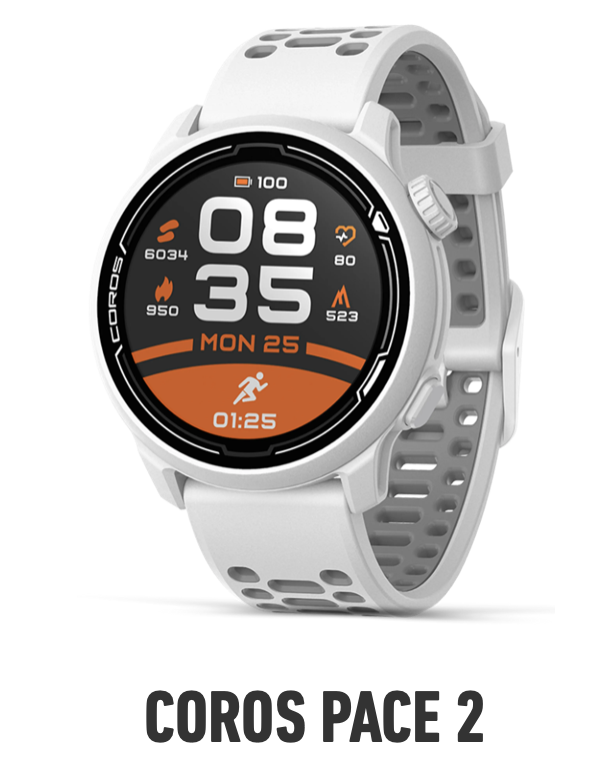The GPS running watch market has never been more competitive. Garmin’s crown as the default choice for any keen runner in the market for a new device is over.
Enter other brands such as Polar, Sunto and Coros – all boasting new features, accuracy levels and price points, which will give Garmin a run for its money.
When it came time to upgrade my tired, old Garmin 230 – a mid range, running specific watch, costing around £250 – there are quite a few options to consider in this feature and price range.

After hours of research I narrowed the choice down to the Garmin 245 or Corps Pace 2. After a little dithering, I went with the Pace 2.
After all, if it’s good enough for Eliud Kipchoge, then it’s good enough for me.
Reasons I went with Coros Pace 2
Let’s cut straight to the conclusion. The Pace 2 has almost everything a runner could need without added complexities. The GPS and wrist-based heart rate monitor is as accurate as anything else on the market – any differences are hardly worth worrying about.
For all the metrics of the watch, check out the Coros website. This review is focused on what’s good from a practical running point of view.
It’s not a navigation tool, it focuses on giving you information about your key running metrics – plus a few more. It’s perfect… almost.
Coros Pace 2 Pros:
Track Mode
The stand-out feature for me was Track Running mode. It’s a brilliant feature I can’t believe has taken this long to find its way onto GPS running watches.
Activate track mode, tell it which lane you’ll be running in, and it will use the GPS feature combined with the known parameters of the track to give you a far more accurate GPS reading.
Gone are the wandering GPS lines. Now you get locked on lines.
Beyond the aesthetics, you can set up 400m lap alerts to record splits far more accurately. I found it to be accurate to within a couple of metres.




Simplicity
In the highly competitive market, watch makers are trying to outdo each other with features – it appears only to justify the astronomical prices.
The Garmin boasts the ability to measure blood oxygen saturation. What’s the point for 99% of runners? A number of in-depth reviews concluded the sensors on the watch tend to be inaccurate enough as to render any data pointless.
The same can be said for navigation features. All my running is on marked tracks or routes I know well so I’d never use this feature.
Where once I would have been impressed by the claims, I found most of the additional features are next to useless.
The Coros doesn’t pretend to be a jack of all trades. Its features are focused on road and track running.


Extra data:
Along with all the usual sensors and metrics – wrist-based heart rate and GPS – you get power. This is an interesting metric, and one I’ve not yet fully worked out how useful it is.
But it seems to be reasonably consistent. A hard but slow hill effort seems to display similar power numbers to a fast and tough flat interval.
Also, it doesn’t seem to have the inaccuracies and lag of wrist-based heart rate. It might turn out that power become a go-to piece of data to work out the intensity of a workout. Time and a few more runs will tell.
Light weight:
It’s the lightest GPS watch in the world. This model with the silicone band weighs in at 35g. The equivalent Garmin is about 10g heavier.
Battery life:
The main reason I gave up on the Garmin was the need for almost daily recharges. I’m getting a full week from the Coros before needing to plug back in.
Coros app:
I found the app incredibly intuitive and more useful than Garmin Connect. The Coros app is a mobile only way to collate and interactive with your running data.
I really liked how the running metrics interact with the map feature. So as you drag your finger across the pace and it will show you where you were on the map when you were putting out these numbers.







What I don’t like
There’s one major feature missing for track runners which I wish Coros would add. Garmin has it and it’s the ability to set up time alerts to ring during a workout.
Why would you want this? If you’re on a track to specific schedule – say 74 second laps in a 5,000m race – I want an audible alert to tell me if I’m up or down on pace. I don’t want to have to glance at my watch. I don’t want something which is dependant on GPS accuracy.
From what I can tell having used the watch for the past month, you can set up a timer but this doesn’t work while you’re doing a work out. So you could have your 74 second alarms, but not collect any data.
It would be an easy fix and would make this the ultimate track runner’s watch. Coros, if you’re reading this, add this feature and you’ll have made the perfect racing and training companion.

